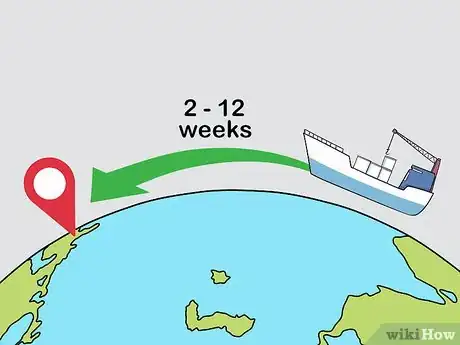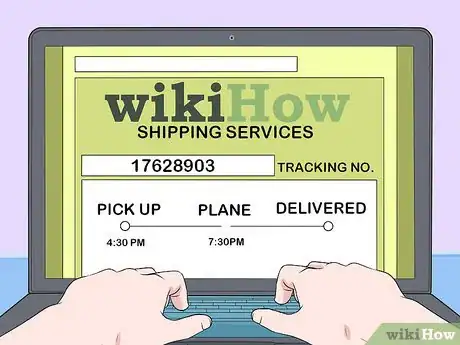This article was co-authored by wikiHow Staff. Our trained team of editors and researchers validate articles for accuracy and comprehensiveness. wikiHow's Content Management Team carefully monitors the work from our editorial staff to ensure that each article is backed by trusted research and meets our high quality standards.
This article has been viewed 12,948 times.
Learn more...
Deciding how to ship your luggage overseas can be a bit of a hassle, but there are several options available to you. If you're flying on a plane, you have the option of checking your bags—this works best if you have 1 or 2 bags that are relatively light. If you have more than 2 bags or they're super heavy, look into sending them overseas using a standard shipping service. There are also luggage services that are designed specifically for shipping luggage, but these tend to be the most expensive.
Steps
Choosing a Service
-
1Check 1 or 2 bags if you’re flying to the destination. Checking your bags on the plane tends to be the cheapest option, but only if you have 1 or 2 bags that weigh less than 50 pounds. This way, your luggage will arrive at the same time you do.[1]
- Research your airline to find out the exact prices of checked luggage.
- Most prominent airlines in the US charge $25 for the first checked bag and $35 for the second, as long as your bag weighs under 50 pounds—extra weight costs extra.
- While you’ll have to carry your luggage to and from the airport, this is a great option if you’re packing at the last minute.
-
2Look into standard delivery services if you have several heavy bags. These are places such as UPS, FedEx, or your local post office. When you ship your luggage through these services, the price will depend largely on the size and weight of your bag, as well as how quickly you’d like it to arrive at its destination.[2]
- Most of these delivery services will give you a tracking number so that you can easily track your luggage once it’s shipped.
- Standard delivery services are often cheaper than using a specific luggage service.
- You may have to drop your luggage off at the delivery service or make special arrangements to have it picked up from your location.
Advertisement -
3Use an international luggage service to send luggage in advance. Luggage services such as Luggage Forward, Luggage Free, and Luggage Concierge will pick up your bag for you and deliver it to your destination. For this option you’ll need to plan ahead and pack in advance, and it tends to be pricier.[3]
- These services advertise being able to pick up your luggage wherever you need them to, such as from your house or place of work. You'll need to check the boundaries of each service individually to see if they'll pick up from your location.
- International luggage services tend to be smaller companies, so you’ll get lots of individualized attention and quality service.
- These companies are also great at shipping oddly-shaped items such as sports equipment, as well as super large bags.
- Other international luggage services include Uni Baggage, Send My Bag, and DUFL.
-
4Send your luggage to its destination by sea if it's not urgent. This can take anywhere from 2-12 weeks, so only use this option if you have lots of time or don't need the luggage right away. These shipping companies charge more for volume than weight, so try to pack your luggage so that it's as small as possible.[4]
- Companies that will ship your luggage by sea include Baggage Hub and Seven Seas Worldwide.
- When you arrange your pick up, make sure that you're present and have your passport in case they need to see it.
- Shipping your luggage by sea tends to be a very cost-efficient option.
-
5Consider getting luggage insurance in case your luggage is lost. There are several companies, such as Travelex Insurance, that will reimburse you if your luggage is lost or stolen while you're traveling once you're insured. Conduct a search online to get a quote and find out if your items would be covered.[5]
- If your luggage is lost, damaged, or stolen and you have insurance, you'll need to follow proper protocol found on your insurance company's website, such as reporting the incident, sending proof of loss, and providing the original receipts for expensive items.
Getting Your Luggage Delivered
-
1Weigh your luggage. No matter which shipping option you choose, you’ll need to know how much your bag weighs. Pack up your bags and use a scale to weigh them once they’re ready to go. You can use a regular scale that you would have at home by standing on it to learn your weight, standing on it while holding your bag, and then subtracting the first number from the second to find out how much your bag weighs.
- You can also buy luggage scales that attach to a handle on your luggage, checking the weight by hanging the luggage from the scale.
- If you’re shipping something like a bike or skis, you can check how much the specific item weighs by researching it online.
-
2Get a quote from the shipping service to see how much it’ll cost. You can do this by visiting the shipping service’s website and clicking on a tab that says something like “check pricing” or “get a quote.” Fill in the details, such as when you’d like to ship your luggage, the weight of your bag(s), and your destination to receive an accurate quote.[6]
-
3Book your luggage shipment online. Your chosen delivery method will have a website to help you through the process of booking your luggage pickup. Decide on a pickup date for your luggage to be shipped, and fill in your payment and personal information.[7]
- When shipping internationally, many companies will require at least 48 hours for them to pick up your order.
- Some companies may also let you book your luggage over the phone.
- If possible, book your luggage several days in advance to ensure the luggage makes it to the final destination on time.
-
4Prepare your luggage for shipment. Double check to make sure your luggage matches the weight you said it would be when booking, especially if you've repacked or added something. Print out the shipping labels for your luggage and put them on before the luggage is picked up, if this is required by the company.[8]
- The company will tell you in your booking email and/or on the website whether or not you'll need to print out and attach your own shipping labels.
- Read any guidelines the company has about what you’re not allowed to pack so that you ensure you’re following the rules—aerosols and flammable items aren't allowed, and liquids are often prohibited as well.
-
5Track your luggage once it’s been picked up. After the service comes to pick up your luggage, you’ll be given a tracking number to see where your luggage is throughout its travels. You’ll most likely track your luggage by clicking on the tracking link through an email that was sent to you.[9]
-
6Contact the shipping service for any questions or concerns. Each shipping service will have a phone number you can call if you need help, most likely given to you in your booking confirmation email. Some websites also have a chat box that pops up on the bottom of the site, allowing you to ask any questions there.[10]
- The company's phone number can also be easily found on their website by looking for tabs such as "Contact Us."
References
- ↑ http://www.cnn.com/2010/TRAVEL/04/13/shipping.luggage/index.html
- ↑ https://www.smartertravel.com/2017/06/19/check-ship-bags/
- ↑ https://www.smartertravel.com/2017/06/19/check-ship-bags/
- ↑ http://traveltips.usatoday.com/send-luggage-sea-103281.html
- ↑ http://www.travelinsurancereview.net/coverages/baggage/
- ↑ https://www.sendmybag.com/how-it-works
- ↑ https://www.luggagefree.com/how-it-works/
- ↑ https://www.sendmybag.com/how-it-works
- ↑ https://www.luggagefree.com/how-it-works/




































































